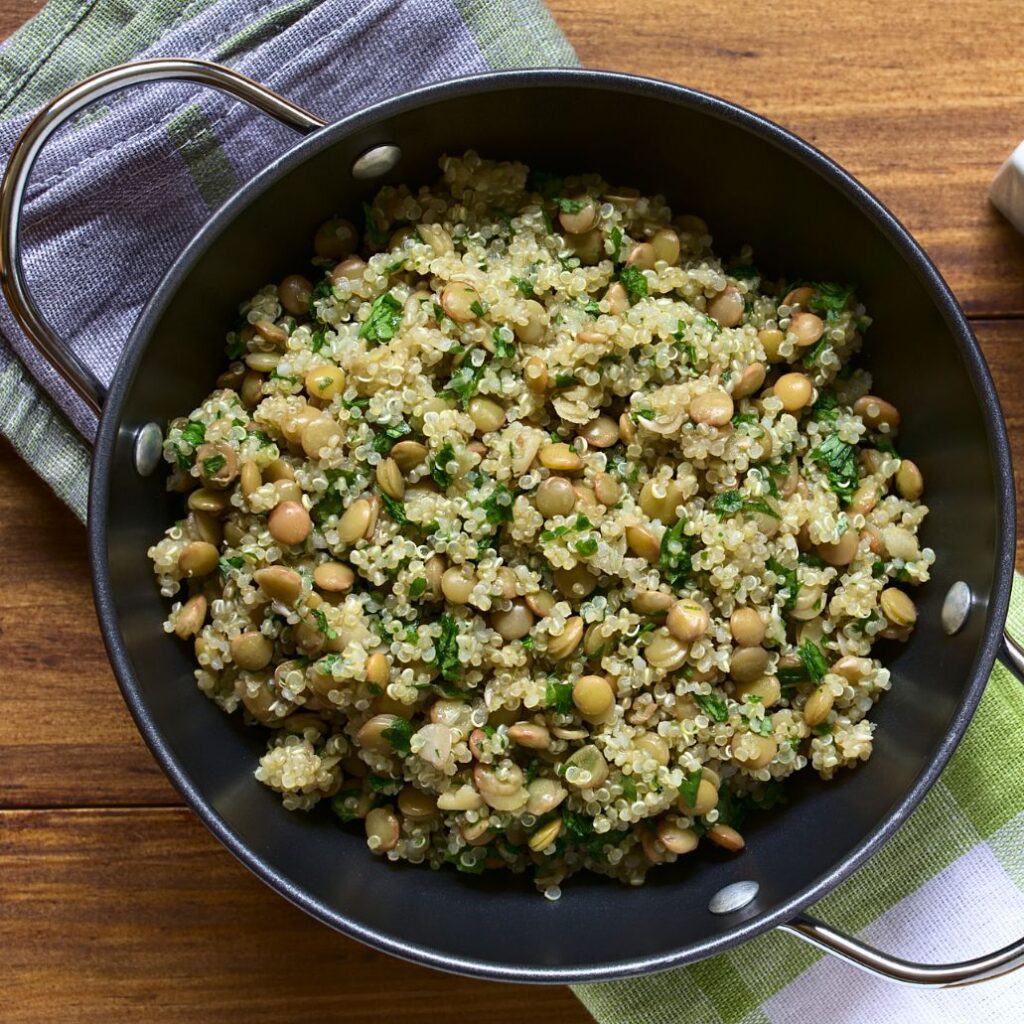Quinoa has become one of the world’s most popular superfoods in recent years. This ancient grain originated in South America, where it has been a dietary staple for thousands of years.
Packed with protein, nutrients and fiber, quinoa can provide numerous health benefits. Here are 8 evidence-based health benefits of quinoa.
1. Highly Nutritious
Quinoa is one of the most nutritious grains available (1) ↗. It contains significant amounts of protein, fiber, B vitamins, iron, zinc, potassium, calcium and antioxidants (2) ↗.
What’s more, compared to common grains, quinoa is higher in mono- and polyunsaturated fats. These healthy fats may help reduce inflammation and disease risk (3) ↗.
Also quinoa is a complete protein containing all the essential amino acids needed for muscle building and tissue repair (4) ↗.
2. Very High in Fiber
Want to feel fuller for longer and support healthy weight management? Quinoa contains 5 grams of fiber per cup. So, not only will quinoa keep you satisfied, but it will also keep your digestive system happy and functioning smoothly. (5) ↗.
The fiber in quinoa is mostly insoluble, which may aid digestion by promoting regular bowel movements and relieving constipation (6) ↗.
3. Gluten-Free
If you have celiac disease or a gluten sensitivity, quinoa is a safe and nutritious alternative to wheat, barley, and other gluten-containing grains. Choosing gluten-free whole grains like quinoa reduces the risk of digestive discomfort and inflammation (7) ↗.
There are many gluten-free options now available, but they are typically made with refined starches, added sugar and other unhealthy ingredients. Quinoa provides a high-quality alternative.
4. Rich in Important Minerals
Quinoa contains many minerals that play vital roles in health, including (8) ↗:
- Manganese: Involved in metabolism, brain function and antioxidant defenses.
- Phosphorus: Key for bone health and cellular function.
- Copper: Required for making red blood cells.
- Iron: Important for delivering oxygen throughout your body.
- Magnesium: Supports bone, muscle and neurological health.
5. Contains Beneficial Plant Compounds
Quinoa contains beneficial polyphenols, phytosterols and flavonoids with antioxidant and anti-inflammatory effects.
Research shows quinoa’s antioxidants may help protect cells from damage that causes diseases (9) ↗.
Flavonoids may also reduce cancer risk. However, more human research is needed (10) ↗.
6. May Improve Metabolic Health
Quinoa is a good choice for people with type 2 diabetes. It has a low glycemic index, which means it won’t cause a big spike in blood sugar levels (11) ↗.
One 12-week study found that using quinoa instead of typical gluten-free breads and pastas significantly reduced blood sugar, insulin and triglyceride levels (12) ↗.
7. Very High in Protein
Protein is made from amino acids. Some of these amino acids are produced in your body, while you must get others from your diet.
Proteins from plant foods like quinoa are considered complete because they contain all the essential amino acids your body needs (4) ↗.
Quinoa contains over 8 grams of protein per cup, making it an excellent plant-based protein source (8) ↗. This is much higher than other grains.
8. May Help You Lose Weight
Quinoa is high in protein and fiber, both of which are important for weight loss. Protein can help reduce appetite and decrease calorie intake (13) ↗.
Fiber also slows digestion and promotes feelings of fullness, which may lead you to eat fewer calories overall (5) ↗.
One study found that 4.4 ounces (125 grams) of cooked quinoa per day for 6 weeks led to reduced calorie intake and weight loss (14) ↗.
Summary
Quinoa is a nutritious seed that has become incredibly popular in the natural health community. It is high in protein, fiber and many vitamins and minerals.
And guess what? It is especially useful for people with gluten intolerance, as it’s naturally gluten-free. Eating quinoa regularly may improve digestion, heart health and blood sugar levels.
It’s quite versatile and easy to add to your diet. Quinoa can be enjoyed for breakfast, lunch or dinner in a multitude of ways.
This highly nutritious grain is worthy of its superfood status and makes an excellent addition to any healthy diet.



